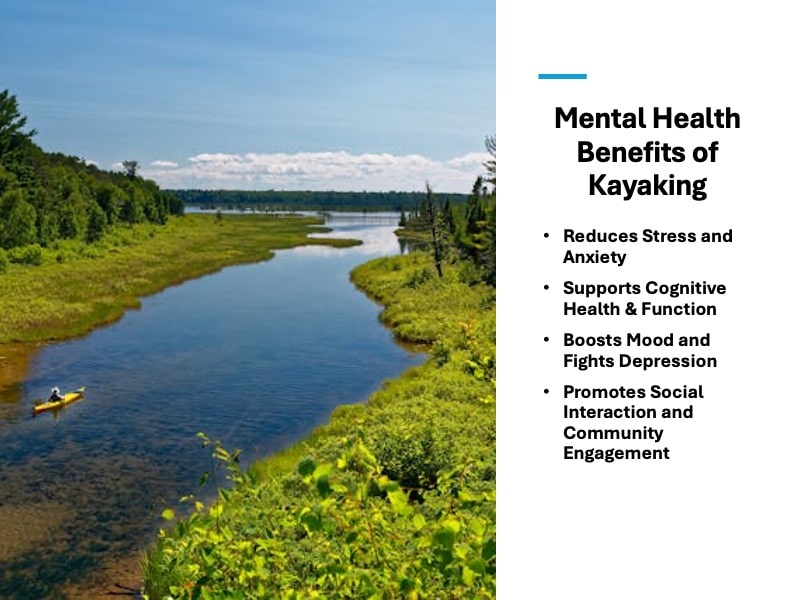Health Benefits of Kayaking: Why is Kayaking Good for You?
Kayaking is more than just a recreational activity; it is a full-body workout that provides a wide range of physical and mental health benefits.
Whether paddling through calm lakes, rough rapids, or open seas, kayaking strengthens muscles, enhances cardiovascular fitness, and improves mental well-being.
Research supports its role in boosting balance, cognitive function, and upper-body strength, making kayaking an ideal activity for all age groups.
Physical Health Benefits of Kayaking
Kayaking is a full-body workout that enhances strength, endurance, and cardiovascular health while being low-impact on the joints.
Whether paddling on calm lakes or navigating through rough waters, kayaking engages multiple muscle groups, improves coordination, and helps burn calories efficiently.
Beyond just building physical fitness, it also promotes overall well-being by encouraging outdoor activity and sustained movement.
Develops Upper Body Strength
Kayaking primarily engages the upper body, requiring continuous movement of the shoulders, arms, back, and core.
Studies indicate that kayaking demands powerful shoulder muscles with a high proportion of fast-twitch fibers for short sprints, while endurance paddlers require slow-twitch fibers for sustained aerobic effort (Shephard, 1987).
This results in increased muscle tone and strength, particularly in the deltoids, trapezius, and latissimus dorsi.
Improves Cardiovascular Fitness
Like other endurance sports, kayaking strengthens the heart and improves cardiovascular endurance.
Paddlers engage in sustained, repetitive movements that elevate heart rate, promoting cardiovascular efficiency.
The metabolic demands of kayaking show significant aerobic and anaerobic contributions, with elite kayakers reaching maximal oxygen consumptions of around 58 ml·kg-1·min-1 (Michael et al., 2008).
This level of cardiovascular demand is comparable to cycling or swimming, making it an excellent way to maintain heart health.
Increases Core and Trunk Stability
Kayaking requires continuous engagement of the core to maintain balance and control the kayak.
The rotational paddling motion strengthens the obliques, lower back, and abdominals, leading to improved trunk stability.
Research suggests that core instability strength training, such as that experienced in kayaking, enhances spinal mobility, dynamic balance, and functional mobility in older adults (Granacher et al., 2013).
Enhances Balance and Coordination
The ability to maintain balance while paddling is critical for efficiency and safety.
A study on ground kayak paddling exercises found that kayaking significantly improved postural balance in older adults with mild cognitive impairment (Choi et al., 2018).
This is attributed to the sport’s demand for continuous stability adjustments and trunk control, which help in everyday functional movements.
Supports Joint Health as a Low-Impact Exercise
Unlike high-impact activities such as running, kayaking is gentle on the joints while still providing an intense workout.
It is an ideal exercise for individuals recovering from injuries or those with conditions like arthritis.
The smooth paddling motion minimizes stress on the joints while enhancing mobility and flexibility.
Mental Health Benefits of Kayaking

Kayaking is not just great for the body—it’s also a powerful tool for mental well-being.
The rhythmic motion of paddling, combined with the calming effect of being on the water, helps reduce stress, improve mood, and enhance overall mental clarity.
Whether you’re gliding through serene lakes or tackling adventurous rapids, kayaking offers a natural escape that promotes relaxation, mindfulness, and emotional balance.
Reduces Stress and Anxiety
Being in nature has been shown to reduce cortisol levels, the hormone associated with stress.
Kayaking, often performed in serene outdoor environments, promotes relaxation and mindfulness.
The rhythmic motion of paddling and the soothing sound of water contribute to a meditative effect, which helps decrease anxiety and promote emotional well-being.
Supports Cognitive Health & Function
Physical activity is closely linked to improved brain function.
A randomized controlled trial demonstrated that kayaking enhances cognitive function in older adults by improving handgrip strength, reaction time, and memory recall (Choi et al., 2018).
The combination of motor coordination, spatial awareness, and aerobic exercise stimulates brain activity, reducing the risk of cognitive decline.
Boosts Mood and Fights Depression
Kayaking triggers the release of endorphins, the body’s natural mood enhancers.
The combination of physical exertion, fresh air, and connection with nature can help combat depression symptoms.
Studies show that aerobic exercise, such as kayaking, plays a significant role in improving mental health by reducing symptoms of depression and increasing feelings of happiness and self-efficacy.
Promotes Social Interaction and Community Engagement
Kayaking can be a solo or social activity, fostering a sense of community and belonging.
Group kayaking trips provide an opportunity to bond with others, share experiences, and develop friendships, which can enhance overall mental well-being.
Social interaction is a crucial factor in reducing loneliness and increasing life satisfaction.
Final Thoughts: Why Kayaking is Good for You as a Lifelong Fitness Activity
Kayaking is an exceptional full-body workout that improves both physical and mental health.
It strengthens muscles, improves cardiovascular fitness, and promotes mental clarity.
Importantly, kayaking is a sport that can be enjoyed at any age, making it a lifelong fitness activity.
Older adults can benefit from its ability to improve muscle performance and postural balance without excessive strain, while younger kayakers can use it as an excellent way to get fit without going to the gym.
Adaptive kayaking options are also available for individuals with disabilities, making it an inclusive sport.
Whether for recreation, fitness, or therapy, kayaking is a versatile activity that benefits people of all ages.
Engaging in regular kayaking sessions can contribute to a healthier, happier, and more active lifestyle.
This website does not provide medical advice. This website site does contain affiliate links, and purchases may earn a commission.
Read my Medical Disclaimer, Review Disclaimer, and Publishing Policies for more details. Use of this site indicates acceptance of these terms.



